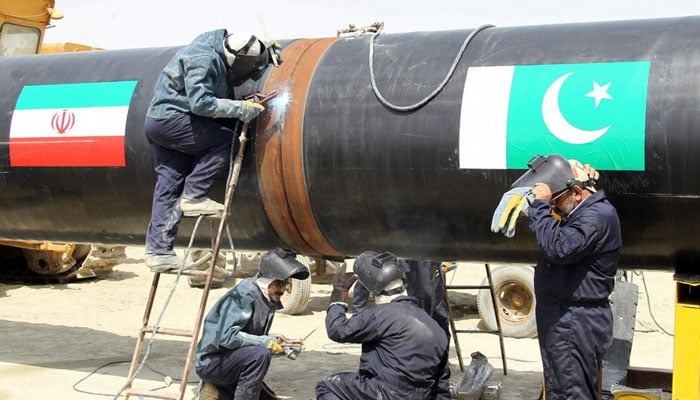Iran-Pakistan gas pipeline: Islamabad pins hopes on US sanctions waiver
“Pakistan will try to seek exemption from US sanctions by presenting technical arguments,” says petroleum minister
Petroleum Minister Musadik Malik said on Monday that Islamabad has decided to obtain a US waiver on the Iran-Pakistan gas pipeline project in a bid to avert sanctions.
“Pakistan will vigorously present its case and will try to seek exemption from US sanctions by presenting technical and political arguments,” he said in an informal conversation with the media.
In February this year, the caretaker government decided to complete the gas line project in its territory under two phases and carved out a plan to first lay the 81km part of the pipeline from Gwadar, a point where Iran has already laid its part of the pipeline from the gas field.
Iran has already extended the 180-day deadline till September 2024 to Pakistan. If Islamabad authorities fail to positively respond, Tehran will move Paris-based International Arbitration seeking a penalty of $18 billion.
In today’s media interaction, the petroleum minister said Pakistan will also engage in lobbying to obtain the US waiver to complete the much-delayed gas line project in its territory.
Malik said the country will start construction on the gas pipeline project soon.
The previous caretaker set-up decided against filing the application to obtain US waiver in view of the geopolitical situation, sources said.
A ministerial oversight committee made decisions related to the Pak-Iran gas pipeline project, they added.
The Biden administration has set a goal to prevent the construction of Iran-Pakistan gas pipeline while also communicating to Islamabad about its red lines on Tehran’s nuclear proliferation ambitions.
“We have warned them about our red lines, legislative, but also in terms of how we cooperate with Pakistan,” Assistant Secretary of State Donald Lu told the Congressional panel during the Congressional hearing on Pakistan.
“If they get in bed with Iran, it will be very serious for our relationship,” Lu said when Congressman Brad Schneider asked about the US messaging about Pakistan’s engagement with Tehran on security matters, especially in the context of mutual concerns of nuclear proliferation in Iran’s nuclear program.
Iran and its relations with Pakistan, especially in terms of the planned gas-pipeline, remained a subject of interest for many members of the congressional panel at the hearing.
The project has been facing delays since 2014. In January, Iran issued a third notice to Islamabad, renewing its intention to move the arbitration court for not laying the pipeline as part of the IP gas line project.
The News reported that Pakistan maintained that it could not materialise the project in its territory because of the US sanctions imposed on Iran, a view which authorities in Tehran have never subscribed, saying the US sanctions are not justified. Iraq and Turkey have been using gas from Iran for long as they have managed waivers on the US sanctions.
It may be pointed out here that Iran had already completed the laying of a 900-kilometre pipeline. The project agreement was signed in 2009 and was to be completed in 2015.
-
Security forces gun down 30 terrorists in multiple IBOs in KP: ISPR
-
MQM-P calls for new province in Sindh
-
US report validates Pakistan military edge over India: PM
-
Banned TTP poses serious threat to Pakistan security: UNSC panel
-
CM Afridi clarifies remarks on by-poll after ECP requests army deployment
-
Dubai sees 3.2m Pakistani passengers in 2025 as airport sets new milestone
-
Security forces kill 23 Indian proxy terrorists in KP's Kurram
-
Pakistan to construct island to boost oil exploration: report












